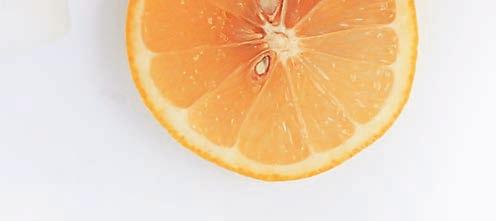
8 minute read
Why Your Belly’s Not Better
Six sneaky things that may be upsetting your gut BY LISA TURNER
You’re avoiding gluten, minimizing carbs, and taking your supplements— and you’re still experiencing indigestion, bloating, stomach upset, or constipation. It may be that common daily habits are harming your gut. Check out these six surprising gut-killers, and make your belly better right now.
Advertisement
1YOUR SUPER-HEALTHY DIET. Beans, lentils, cashews, beets, cauliflower, blackberries, apples, and other plant foods are nutrientdense and loaded with fiber—but if you’re sensitive, they can wreak havoc on your digestive system. These and other good-for-you foods are high in FODMAPS (fermentable oligosaccharides, disaccharides, monosaccharides and polyols)—carbohydrates that aren’t fully digested and can be fermented by gut bacteria, causing pain, gas, bloating, constipation, and diarrhea in some people. Even if you’re not sensitive to FODMAPs, an increase in high-fiber foods can overload your digestive system and cause distress. And some studies show that decreasing fiber may improve constipation in people following a high- fiber diet. GUT-HEALTH GUIDELINES: We’re definitely not saying you should stop eating beans, fruits, and vegetables; but if you’re new to a high-fiber diet, start slow. Add fiber-rich foods gradually and drink plenty of water. To make beans easier to digest, soak them overnight to remove oligosaccharides, then drain the soaking water before cooking. And if you have irritable bowel syndrome (IBS) or other chronic gut issues, consider a low-FODMAP diet; studies show it can improve symptoms. Check out Healthy Gut, Flat Stomach: The Fast and Easy Low-FODMAP Diet Plan by Danielle Capalino, MSPH, RD, for more information. 2 THE KETO DIET. Short for ketogenic, the Keto plan drastically reduces carbohydrate intake and replaces it with high quantities of fat. While low-carb diets have many benefits, they can cause problems with digestive health. Studies suggest that a diet high in saturated fat tends to increase harmful gut bacteria while diminishing beneficial bacteria. Keto and other low-carb diets generally tend to be higher in animal protein, which also has an unfavorable impact on the microbiome. Red meat in particular may promote the growth of harmful intestinal bacteria and potentially increase the risk of IBS and other gut disorders. And some sugar alcohols, used as sugar alternatives on low-carb diets, can cause gas, bloating, and other digestive issues. GUT-HEALTH GUIDELINES: You don’t have to ditch your low-carb diet, but if you’re struggling with belly issues, be careful with your red meat and saturated fat intake, and skip those sugar alcohols. 3 THAT STARBUCKS ADDICTION. Coffee causes an increase in stomach acid and can lead to heartburn, acid indigestion, or reflux. Caffeine also stimulates peristalsis— the rhythmic contractions of the intestines that move stool matter— which can cause diarrhea or loose stools in some people. And drinking coffee can slow digestion: caffeine increases the production of adrenaline and noradrenaline, which causes the heart to beat faster and can result in decreased blood flow to the intestines. It’s also a diuretic, which can impact gastrointestinal health. GUT-HEALTH GUIDELINES: None of this means that you can’t ever drink coffee; just moderate your consumption and drink a full glass of water after every cup. If you suffer from heartburn, gastroesophageal reflux disease (GERD), or excess stomach acid, try a lower-acid coffee, or switch to a coffee substitute made from mushrooms or adaptogenic herbs. And on a happier note: some studies suggest that coffee is good for gut bacteria, increasing diversity and promoting growth of some friendly strains. 4 COCKTAIL HOUR. That daily drink not only harms your liver, it may be messing with your gut as well. Alcohol irritates the stomach lining, interferes with gastric acid secretion in the stomach, impairs muscle movement in the intestines, and relaxes the esophageal sphincter, which increases the risk of heartburn. Studies also show that alcohol can cause an imbalance in gut bacteria and increase the numbers of harmful bugs. GUT-HEALTH GUIDELINES: Drink in moderation, and not every day. If you do drink, switch to red wine. In one study, hard liquor reduced beneficial bacteria in the gut, while moderate amounts of red wine increased good gut bacteria and decreased harmful bacteria. 5 YOUR GO-GO LIFESTYLE. If your high-action way of life means fewer hours of shut-eye, you may be compromising gut health. Lack of sleep increases stomach acid, decreases intestinal motility, and hampers blood flow and digestion. In one study, only two nights of sleep deprivation altered gut microbes and increased the abundance of bacteria associated with weight gain, obesity, and type 2 diabetes. A disruption in your body’s circadian rhythm—lots of parties or late-night work dinners—can increase the risk of a variety of gastrointestinal diseases, including IBS, GERD, and peptic ulcer disease. And a high-stress job or lifestyle can dramatically impact digestive health and also lead to changes in gut microbiota, reducing overall diversity, lowering beneficial bacteria and increasing potentially harmful bacteria.
3 HERBS FOR GAS
Let’s get something straight. The word “bloating”? It’s the word du jour, and I hear it a lot. The thing is, most people who complain about abdominal bloating don’t know that gas (not just water retention) is a major cause. This “bloat” is any abnormal swelling, or increase in diameter, of the abdominal area.
A gut full of gas may sound trivial, but that constant pressure and resulting abdominal pain can be among the most annoying symptoms a person can endure. It pales next to a brain tumor, but it can sure ruin a good day.
Gas can form anywhere in the digestive tract, but it largely comes from bacterial action in the large intestine, as a byproduct of fermentation. Those bugs live off our waste. So if undigested carbohydrates make their way to the bacterial homeland, the microbes break them down to simpler compounds, including some in gaseous form. Certain herbs can stimulate the secretion of digestive juices that assist the body in digestion and can help to alleviate gas.
PARSLEY-FAMILY HERBS
The parsley family is famous for its collection of gas-suppressing seeds—think fennel, cumin, dill, anise, coriander, and caraway. The theory is that the abundant essential oils in these seeds bump up digestive juices, and may also kill bad bacteria.
In my mind, fennel is the world champion. In a recent Italian study, fennel and coriander were both found to be natural bactericides. A 2016 study found that anethole, a major constituent in fennel seed, restored delayed gastric emptying. In another trial, 95 percent of study participants taking an herbal mixture containing fennel, as well as dandelion, St. John’s wort, lemon balm, and calendula, experienced complete relief of colitis symptoms, including abdominal pain and cramping, within two weeks.
Use fennel, or any of these parsley family seeds, by taking them in capsules, tablets, or tinctures; or chewing the whole seeds or drinking as a tea as needed.
GINGER
Ginger, a warming herb, is a first-aid kit on a plate. This time-tested remedy is used by nearly every culture in the world as a treatment for gas. It reduces gut spasms, absorbs and neutralizes toxins in the GI tract, and boosts digestive juice secretion, including bile and saliva. A recent paper reported that ginger enhanced fat digestion by stimulating bile and pancreatic lipase enzymes. This spicy root contains constituents that soothe the gut and aid digestion.
Prepare a tea and drink after a large meal to ease discomfort. Drink three times a day, or as much as needed to lessen the bloating. I also recommend taking ginger in capsules and tinctures.
BLACK PEPPER
On the whole, warming herbs reduce gas and bloating, and black pepper is an excellent example. It is one of the most valued herbs in Asia. Piperine, a main active constituent, has a reputation for increasing bioavailability and absorption of nutrients. It works in part by increasing intestinal motility, which is known to reduce gas. It is often combined with long pepper, a close relative, which tends to moisturize tissues, such as those in the digestive tract, while black pepper tends to reduce excess moisture.
Use black pepper in tea or capsules. Start with 500 mg per meal and increase with each meal until you have banned the bloat. —Karta Purkh Sighn Khalsa, DN-C, RH
GUT-HEALTH GUIDELINES: As much as possible, try to keep a regular sleep routine, going to bed at the same time every night and getting up at the same time the next morning (preferably 8 hours later). And practice good sleep hygiene: avoid excessive caff eine and alcohol consumption, as well as screen time before bedtime; keep your bedroom cool, dark, and quiet; and limit nighttime snacking to small amounts of high-protein food. If you’re overstressed and have trouble sleeping, natural sleep aids such as valerian root and melatonin can help.
6SKIPPING THE GYM. Regular physical activity not only lowers stress, encourages weight loss, and reduces the risk of chronic disease, it can also positively impact intestinal bacteria and improve gut health. If you’re not moving, the digestive tract can’t move waste through your system properly, leading to constipation, IBS, and other gut health issues. And recent studies suggest that physical activity can improve gut fl ora, promoting diversity and increasing levels of benefi cial bacteria. GUT-HEALTH GUIDELINES: You don’t have to be a superstar athlete to reap the benefi ts of exercise. Any regular physical activity, even at low-to-moderate intensities (think walking, gardening, ballroom dancing), is benefi cial. The key is to fi nd an activity that you really enjoy, and keep doing it!
C instant brightness.



Soak in the C.


DERMA E’s Vitamin C line is formulated with stabilized, antioxidant-rich Vitamin C to brighten, even skin tone, hydrate, protect, nourish, and support collagen health for a soft, radiant complexion.
showed visual improvement in skin radiance/brightness
agree to strongly agree that appearance of uneven skin tone was improved

agree to strongly agree that skin was brightened

*Based on results from independent 6-week clinical studies on the Vitamin C line.










